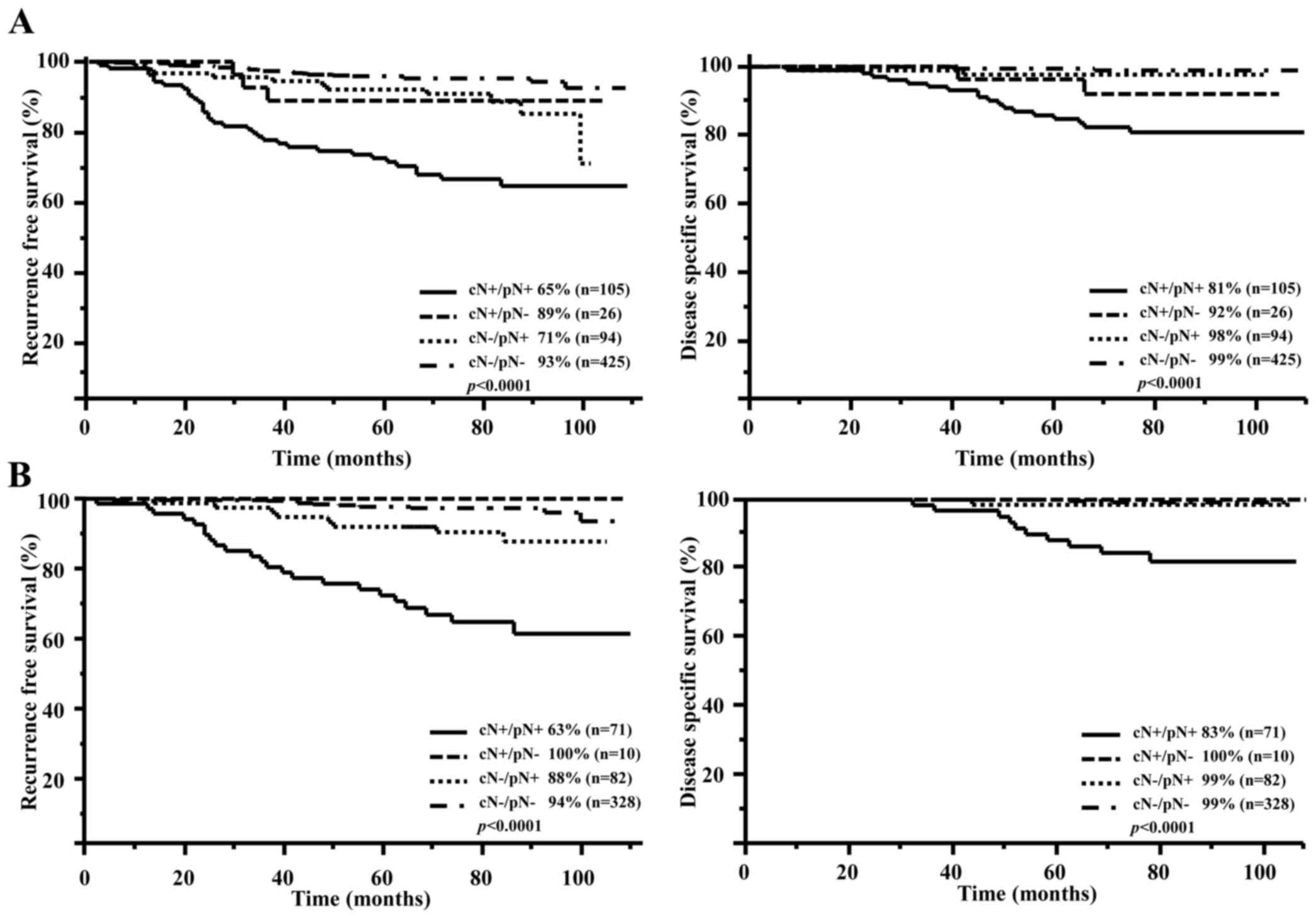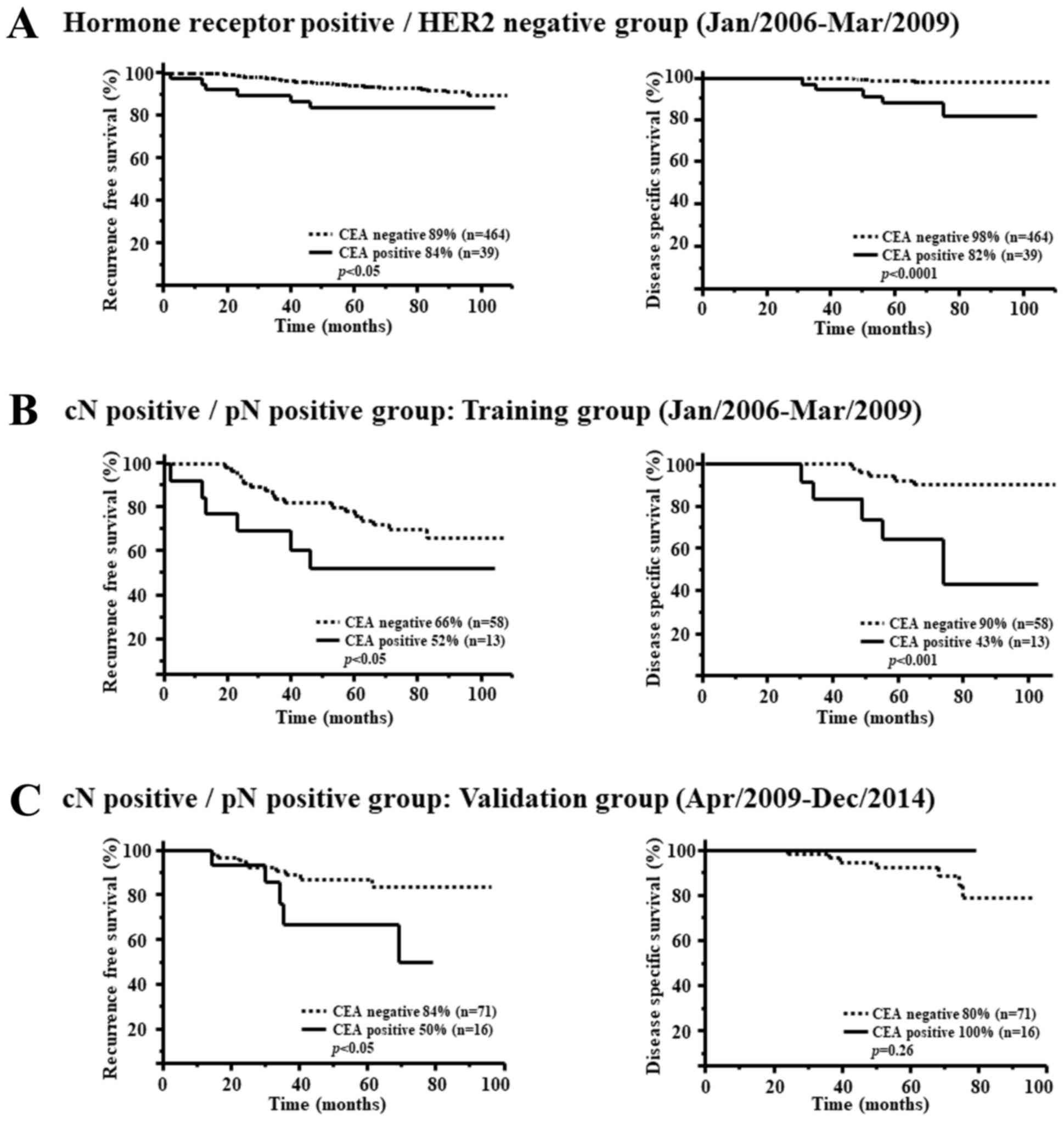|
1
|
Jemal A, Bray F, Center MM, Ferlay J, Ward
E and Forman D: Global cancer statistics. CA Cancer J Clin.
61:69–90. 2011. View Article : Google Scholar : PubMed/NCBI
|
|
2
|
Lam SW, Jimenez CR and Boven E: Breast
cancer classification by proteomic technologies: Current state of
knowledge. Cancer Treat Rev. 40:129–138. 2014. View Article : Google Scholar : PubMed/NCBI
|
|
3
|
Cleary AS, Leonard TL, Gestl SA and
Gunther EJ: Tumour cell heterogeneity maintained by cooperating
subclones in Wnt-driven mammary cancers. Nature. 508:113–117. 2014.
View Article : Google Scholar : PubMed/NCBI
|
|
4
|
Geyer FC, Marchio C and Reis-Filho JS: The
role of molecular analysis in breast cancer. Pathology. 41:77–88.
2009. View Article : Google Scholar : PubMed/NCBI
|
|
5
|
Weigelt B, Horlings HM, Kreike B, Hayes
MM, Hauptmann M, Wessels LF, de Jong D, Van de Vijver MJ, Van't
Veer LJ and bPeterse JL: Refinement of breast cancer classification
by molecular characterization of histological special types. J
Pathol. 216:141–150. 2008. View Article : Google Scholar : PubMed/NCBI
|
|
6
|
Yersal O and Barutca S: Biological
subtypes of breast cancer: Prognostic and therapeutic implications.
World J Clin Oncol. 5:412–424. 2014. View Article : Google Scholar : PubMed/NCBI
|
|
7
|
Parker JS, Mullins M, Cheang MC, Leung S,
Voduc D, Vickery T, Davies S, Fauron C, He X, Hu Z, et al:
Supervised risk predictor of breast cancer based on intrinsic
subtypes. J Clin Oncol. 27:1160–1167. 2009. View Article : Google Scholar : PubMed/NCBI
|
|
8
|
Perou CM, Sørlie T, Eisen MB, van de Rijn
M, Jeffrey SS, Rees CA, Pollack JR, Ross DT, Johnsen H, Akslen LA,
et al: Molecular portraits of human breast tumours. Nature.
406:747–752. 2000. View
Article : Google Scholar : PubMed/NCBI
|
|
9
|
Sorlie T, Tibshirani R, Parker J, Hastie
T, Marron JS, Nobel A, Deng S, Johnsen H, Pesich R, Geisler S, et
al: Repeated observation of breast tumor subtypes in independent
gene expression data sets. Proc Natl Acad Sci USA. 100:8418–8423.
2003. View Article : Google Scholar : PubMed/NCBI
|
|
10
|
Fan C, Oh DS, Wessels L, Weigelt B, Nuyten
DS, Nobel AB, van't Veer LJ and Perou CM: Concordance among
gene-expression-based predictors for breast cancer. N Engl J Med.
355:560–569. 2006. View Article : Google Scholar : PubMed/NCBI
|
|
11
|
Sørlie T, Perou CM, Tibshirani R, Aas T,
Geisler S, Johnsen H, Hastie T, Eisen MB, van de Rijn M, Jeffrey
SS, et al: Gene expression patterns of breast carcinomas
distinguish tumor subclasses with clinical implications. Proc Natl
Acad Sci USA. 98:10869–10874. 2001. View Article : Google Scholar : PubMed/NCBI
|
|
12
|
Goldhirsch A, Wood WC, Gelber RD, Coates
AS, Thürlimann B and Senn HJ: 10th St. Gallen conference: Progress
and promise: Highlights of the international expert consensus on
the primary therapy of early breast cancer 2007. Ann Oncol.
18:1133–1144. 2007. View Article : Google Scholar : PubMed/NCBI
|
|
13
|
Goldhirsch A, Ingle JN, Gelber RD, Coates
AS, Thürlimann B and Senn HJ: Panel members: Thresholds for
therapies: Highlights of the St Gallen International expert
consensus on the primary therapy of early breast cancer 2009. Ann
Oncol. 20:1319–1329. 2009. View Article : Google Scholar : PubMed/NCBI
|
|
14
|
Goldhirsch A, Wood WC, Coates AS, Gelber
RD, Thürlimann B and Senn HJ: Panel members: Strategies for
subtypes-dealing with the diversity of breast cancer: Highlights of
the St. Gallen International expert consensus on the primary
therapy of early breast cancer 2011. Ann Oncol. 22:1736–1747. 2011.
View Article : Google Scholar : PubMed/NCBI
|
|
15
|
Nishimiya H, Kosaka Y, Yamashita K,
Minatani N, Kikuchi M, Ema A, Nakamura K, Waraya M, Sengoku N,
Tanino H, et al: Prognostic significance of Ki-67 in
chemotherapy-naive breast cancer patients with 10-year follow-up.
Anticancer Res. 34:259–268. 2014.PubMed/NCBI
|
|
16
|
Aebi S, Sun Z, Braun D, Price KN,
Castiglione-Gertsch M, Rabaglio M, Gelber RD, Crivellari D,
Lindtner J, Snyder R, et al: Differential efficacy of three cycles
of CMF followed by tamoxifen in patients with ER-positive and
ER-negative tumors: Long-term follow up on IBCSG Trial IX. Ann
Oncol. 22:1981–1987. 2011. View Article : Google Scholar : PubMed/NCBI
|
|
17
|
Dafni U, Grimani I, Xyrafas A, Eleftheraki
AG and Fountzilas G: Fifteen-year trends in metastatic breast
cancer survival in Greece. Breast Cancer Res Treat. 119:621–631.
2010. View Article : Google Scholar : PubMed/NCBI
|
|
18
|
Dawood S, Broglio K, Gonzalez-Angulo AM,
Buzdar AU, Hortobagyi GN and Giordano SH: Trends in survival over
the past two decades among white and black patients with newly
diagnosed stage IV breast cancer. J Clin Oncol. 26:4891–4898. 2008.
View Article : Google Scholar : PubMed/NCBI
|
|
19
|
Gennari A, Conte P, Rosso R, Orlandini C
and Bruzzi P: Survival of metastatic breast carcinoma patients over
a 20-year period: A retrospective analysis based on individual
patient data from six consecutive studies. Cancer. 104:1742–1750.
2005. View Article : Google Scholar : PubMed/NCBI
|
|
20
|
Early Breast Cancer Trialists'
Collaborative Group (EBCTCG), . Effects of chemotherapy and
hormonal therapy for early breast cancer on recurrence and 15-year
survival: An overview of the randomised trials. Lancet.
365:1687–1717. 2005. View Article : Google Scholar : PubMed/NCBI
|
|
21
|
Arimidex, Tamoxifen, Alone or in
Combination (ATAC) Trialists' Group, . Forbes JF, Cuzick J, Buzdar
A, Howell A, Tobias JS and Baum M: Effect of anastrozole and
tamoxifen as adjuvant treatment for early-stage breast cancer:
100-month analysis of the ATAC trial. Lancet Oncol. 9:45–53. 2008.
View Article : Google Scholar : PubMed/NCBI
|
|
22
|
Smith I, Procter M, Gelber RD, Guillaume
S, Feyereislova A, Dowsett M, Goldhirsch A, Untch M, Mariani G,
Baselga J, et al: 2-year follow-up of trastuzumab after adjuvant
chemotherapy in HER2-positive breast cancer: A randomised
controlled trial. Lancet. 369:29–36. 2007. View Article : Google Scholar : PubMed/NCBI
|
|
23
|
Piccart-Gebhart MJ, Procter M,
Leyland-Jones B, Goldhirsch A, Untch M, Smith I, Gianni L, Baselga
J, Bell R, Jackisch C, et al: Trastuzumab after adjuvant
chemotherapy in HER2-positive breast cancer. N Engl J Med.
353:1659–1672. 2005. View Article : Google Scholar : PubMed/NCBI
|
|
24
|
Shigematsu H, Kawaguchi H, Nakamura Y,
Tanaka K, Shiotani S, Koga C, Nishimura S, Taguchi K, Nishiyama K
and Ohno S: Significant survival improvement of patients with
recurrent breast cancer in the periods 2001–2008 vs. 1992–2000. BMC
Cancer. 11:1182011. View Article : Google Scholar : PubMed/NCBI
|
|
25
|
Kurebayashi J, Miyoshi Y, Ishikawa T, Saji
S, Sugie T, Suzuki T, Takahashi S, Nozaki M, Yamashita H, Tokuda Y
and Nakamura S: Clinicopathological characteristics of breast
cancer and trends in the management of breast cancer patients in
Japan: Based on the Breast Cancer Registry of the Japanese Breast
Cancer Society between 2004 and 2011. Breast Cancer. 22:235–244.
2015. View Article : Google Scholar : PubMed/NCBI
|
|
26
|
Tamaki M, Kamio T, Kameoka S, Kojimahara N
and Nishikawa T: The relevance of the intrinsic subtype to the
clinicopathological features and biomarkers in Japanese breast
cancer patients. World J Surg Oncol. 11:2932013. View Article : Google Scholar : PubMed/NCBI
|
|
27
|
Davies C, Pan H, Godwin J, Gray R,
Arriagada R, Raina V, Abraham M, Alencar Medeiros VH, Badran A,
Bonfill X, et al: Long-term effects of continuing adjuvant
tamoxifen to 10 years versus stopping at 5 years after diagnosis of
oestrogen receptor-positive breast cancer: ATLAS, a randomised
trial. Lancet. 381:805–816. 2013. View Article : Google Scholar : PubMed/NCBI
|
|
28
|
Gray R, Davies C and Perry P: Tamoxifen
for early breast cancer: Better late than never. Ann Oncol.
11:505–507. 2000. View Article : Google Scholar : PubMed/NCBI
|
|
29
|
Goss PE, Ingle JN, Pritchard KI, Robert
NJ, Muss H, Gralow J, Gelmon K, Whelan T, Strasser-Weippl K, Rubin
S, et al: Extending aromatase-inhibitor adjuvant therapy to 10
years. N Engl J Med. 375:209–219. 2016. View Article : Google Scholar : PubMed/NCBI
|
|
30
|
Uehara M, Kinoshita T, Hojo T,
Akashi-Tanaka S, Iwamoto E and Fukutomi T: Long-term prognostic
study of carcinoembryonic antigen (CEA) and carbohydrate antigen
15-3 (CA 15-3) in breast cancer. Int J Clin Oncol. 13:447–451.
2008. View Article : Google Scholar : PubMed/NCBI
|
|
31
|
Shao Y, Sun X, He Y, Liu C and Liu H:
Elevated levels of serum tumor markers CEA and CA15-3 are
prognostic parameters for different molecular subtypes of breast
cancer. PLoS One. 10:e01338302015. View Article : Google Scholar : PubMed/NCBI
|
|
32
|
Lee JS, Park S, Park JM, Cho JH, Kim SI
and Park BW: Elevated levels of preoperative CA 15-3 and CEA serum
levels have independently poor prognostic significance in breast
cancer. Ann Oncol. 24:1225–1231. 2013. View Article : Google Scholar : PubMed/NCBI
|
|
33
|
Pedersen AC, Sørensen PD, Jacobsen EH,
Madsen JS and Brandslund I: Sensitivity of CA 15-3, CEA and serum
HER2 in the early detection of recurrence of breast cancer. Clin
Chem Lab Med. 51:1511–1519. 2013. View Article : Google Scholar : PubMed/NCBI
|
|
34
|
Park BW, Oh JW, Kim JH, Park SH, Kim KS,
Kim JH and Lee KS: Preoperative CA 15-3 and CEA serum levels as
predictor for breast cancer outcomes. Ann Oncol. 19:675–681. 2008.
View Article : Google Scholar : PubMed/NCBI
|
|
35
|
Yang Y, Zhang H, Zhang M, Meng Q, Cai L
and Zhang Q: Elevation of serum CEA and CA15-3 levels during
antitumor therapy predicts poor therapeutic response in advanced
breast cancer patients. Oncol Lett. 14:7549–7556. 2017.PubMed/NCBI
|
|
36
|
von Minckwitz G, Untch M, Blohmer JU,
Costa SD, Eidtmann H, Fasching PA, Gerber B, Eiermann W, Hilfrich
J, Huober J, et al: Definition and impact of pathologic complete
response on prognosis after neoadjuvant chemotherapy in various
intrinsic breast cancer subtypes. J Clin Oncol. 30:1796–1804. 2012.
View Article : Google Scholar : PubMed/NCBI
|
|
37
|
Wolmark N, Wang J, Mamounas E, Bryant J
and Fisher B: Preoperative chemotherapy in patients with operable
breast cancer: Nine-year results from National Surgical Adjuvant
Breast and Bowel Project B-18. J Natl Cancer Inst Monogr. 1–102.
2001.
|
|
38
|
Rastogi P, Anderson SJ, Bear HD, Geyer CE,
Kahlenberg MS, Robidoux A, Margolese RG, Hoehn JL, Vogel VG, Dakhil
SR, et al: Preoperative chemotherapy: Updates of National surgical
adjuvant breast and bowel project protocols B-18 and B-27. J Clin
Oncol. 26:778–785. 2008. View Article : Google Scholar : PubMed/NCBI
|
|
39
|
Fisher B, Bryant J, Wolmark N, Mamounas E,
Brown A, Fisher ER, Wickerham DL, Begovic M, DeCillis A, Robidoux
A, et al: Effect of preoperative chemotherapy on the outcome of
women with operable breast cancer. J Clin Oncol. 16:2672–2685.
1998. View Article : Google Scholar : PubMed/NCBI
|
|
40
|
Carey LA, Metzger R, Dees EC, Collichio F,
Sartor CI, Ollila DW, Klauber-DeMore N, Halle J, Sawyer L, Moore DT
and Graham ML: American Joint Committee on Cancer
tumor-node-metastasis stage after neoadjuvant chemotherapy and
breast cancer outcome. J Natl Cancer Inst. 97:1137–1142. 2005.
View Article : Google Scholar : PubMed/NCBI
|
















